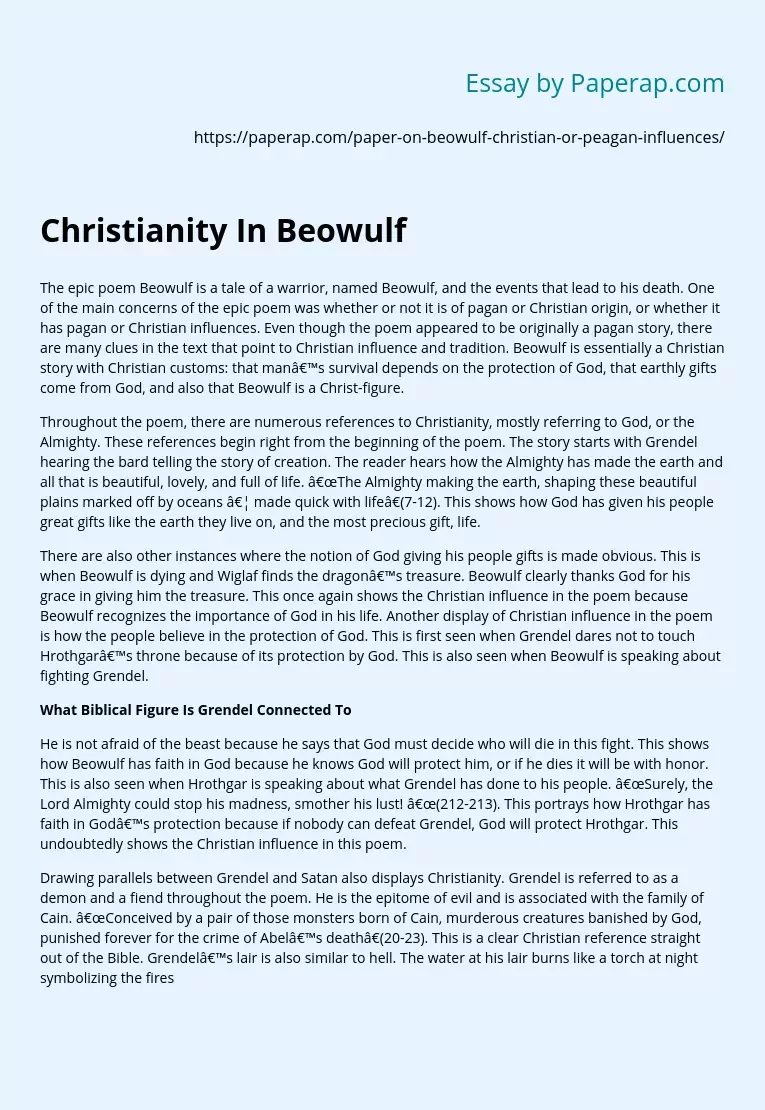Christianity In Beowulf
The epic poem Beowulf is a tale of a warrior, named Beowulf, and the events that lead to his death. One of the main concerns of the epic poem was whether or not it is of pagan or Christian origin, or whether it has pagan or Christian influences. Even though the poem appeared to be originally a pagan story, there are many clues in the text that point to Christian influence and tradition. Beowulf is essentially a Christian story with Christian customs: that man’s survival depends on the protection of God, that earthly gifts come from God, and also that Beowulf is a Christ-figure.
Throughout the poem, there are numerous references to Christianity, mostly referring to God, or the Almighty. These references begin right from the beginning of the poem. The story starts with Grendel hearing the bard telling the story of creation. The reader hears how the Almighty has made the earth and all that is beautiful, lovely, and full of life.
“The Almighty making the earth, shaping these beautiful plains marked off by oceans … made quick with life”(7-12). This shows how God has given his people great gifts like the earth they live on, and the most precious gift, life.
There are also other instances where the notion of God giving his people gifts is made obvious. This is when Beowulf is dying and Wiglaf finds the dragon’s treasure. Beowulf clearly thanks God for his grace in giving him the treasure. This once again shows the Christian influence in the poem because Beowulf recognizes the importance of God in his life.
Another display of Christian influence in the poem is how the people believe in the protection of God. This is first seen when Grendel dares not to touch Hrothgar’s throne because of its protection by God. This is also seen when Beowulf is speaking about fighting Grendel.
What Biblical Figure Is Grendel Connected To
He is not afraid of the beast because he says that God must decide who will die in this fight. This shows how Beowulf has faith in God because he knows God will protect him, or if he dies it will be with honor. This is also seen when Hrothgar is speaking about what Grendel has done to his people. “Surely, the Lord Almighty could stop his madness, smother his lust! “(212-213). This portrays how Hrothgar has faith in God’s protection because if nobody can defeat Grendel, God will protect Hrothgar. This undoubtedly shows the Christian influence in this poem.
Drawing parallels between Grendel and Satan also displays Christianity. Grendel is referred to as a demon and a fiend throughout the poem. He is the epitome of evil and is associated with the family of Cain. “Conceived by a pair of those monsters born of Cain, murderous creatures banished by God, punished forever for the crime of Abel’s death”(20-23). This is a clear Christian reference straight out of the Bible. Grendel’s lair is also similar to hell. The water at his lair burns like a torch at night symbolizing the fires of hell. Grendel’s lair is where evil lives and thus is like hell.
The ultimate portrayal of Christian influence in Beowulf is that Beowulf himself can be seen as being a Christ figure. There are some significant similarities between Jesus Christ and Beowulf. Jesus is called upon by the Almighty King (God) to give his life for the purpose of defeating evil. Only Jesus could get rid of sin and evil, and nobody else. Like Jesus, Beowulf is called upon by the King of the Danes, Hrothgar, to defeat evil (Grendel). Only Beowulf could defeat Grendel. Jesus was prepared and willing to die for the sake of good and righteousness. The same can be said about Beowulf.
He realized that he could die but was willing to give his life in the quest for righteousness. Also, both men were ethical. “My hands alone shall fight for me”(172-173). Beowulf wanted the battle between good and evil to be fair and equal, so he wanted to fight with only his hands. Jesus was also an ethical man. He is the model of ethics for Christians of all time. Both men met their death in the defense of goodness and in the battle against evil. Finally, for both men, after their deeds to defeat evil were finished, they had their stories retold. For Jesus, the apostles spread the news of Jesus’ victory over evil.
For Beowulf, the people were so joyful from his victory over Grendel, that they retold his bravery all over the land. In conclusion, although showing signs of being a pagan story, Beowulf is primarily a Christian story. There are many Christian elements in the poem such as: earthly gifts come from God, Grendel being connected to the family of Cain, God offering protection to his people, and Beowulf being seen as Christ-like. Beowulf is a poem filled with Christian customs that show man believes in God and there is good in the world, and Beowulf is a man who is willing to die to defend the world against evil.
Christianity In Beowulf. (2019, Dec 05). Retrieved from https://paperap.com/paper-on-beowulf-christian-or-peagan-influences/

